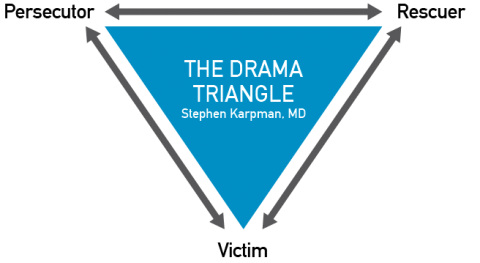ATD Blog
Sharing Responsibility for Learning Outcomes
Wed Apr 04 2018

Content
In general, people don’t like conflict. In the last year, Next Element surveyed nearly 2000 people about their response to conflict. One in four participants (72 percent) said they choose compromise to avoid conflict. However, nearly one third reported that they habitually slip into drama.
In general, people don’t like conflict. In the last year, Next Element surveyed nearly 2000 people about their response to conflict. One in four participants (72 percent) said they choose compromise to avoid conflict. However, nearly one third reported that they habitually slip into drama.
Content
Drama is what happens when we fall into one of three behavioral roles and seek justification for our behavior while losing sight of effectiveness. It’s called the Drama Triangle (see Figure 1).
Drama is what happens when we fall into one of three behavioral roles and seek justification for our behavior while losing sight of effectiveness. It’s called the Drama Triangle (see Figure 1).
Content
Figure 1. The Drama Triangle
Figure 1. The Drama Triangle

Content
The Persecutor assumes the position that they are OK but others are not. Consequently, they feel justified in using intimidation, guilt, blame, and attacks to get what they want. Victims assume the opposite position, putting themselves down and inviting criticism. Rescuers overthink and over-do for others with unsolicited advice, violating another person’s autonomy and free choice while creating dependence.
The Persecutor assumes the position that they are OK but others are not. Consequently, they feel justified in using intimidation, guilt, blame, and attacks to get what they want. Victims assume the opposite position, putting themselves down and inviting criticism. Rescuers overthink and over-do for others with unsolicited advice, violating another person’s autonomy and free choice while creating dependence.
Content
Learning and development professionals aren’t immune from drama. Next Element surveyed more than 500 L&D pros at the 2016 and 2017 ATD International Conferences using the Drama Resilience Assessment (DRA), an online evaluation of a person’s risk for each of the three drama roles, as well as their capacity to choose a more constructive course of action.
Learning and development professionals aren’t immune from drama. Next Element surveyed more than 500 L&D pros at the 2016 and 2017 ATD International Conferences using the Drama Resilience Assessment (DRA), an online evaluation of a person’s risk for each of the three drama roles, as well as their capacity to choose a more constructive course of action.
Content
Participants in the survey exhibited the highest risk on the Rescuer role. Rescuers often have an air of superiority with an attitude of “I know what’s best for you.” The next most common role was Victim, though. Many working in L&D described how they switch from Rescuer to Victim if their help isn’t appreciated or their efforts backfire. Not surprisingly, many described their bosses as the Persecutor.
Participants in the survey exhibited the highest risk on the Rescuer role. Rescuers often have an air of superiority with an attitude of “I know what’s best for you.” The next most common role was Victim, though. Many working in L&D described how they switch from Rescuer to Victim if their help isn’t appreciated or their efforts backfire. Not surprisingly, many described their bosses as the Persecutor.
Enter Compassionate Accountability
Content
Compassionate accountability is a blending of kindness, care, and concern with attention to results and boundaries. It replaces the roles of Victim, Rescuer, and Persecutor with the skills of Openness, Resourcefulness, and Persistence to create a learning environment where responsibility for learning outcomes is shared—all in a spirit of dignity. Let’s take a closer look.
Compassionate accountability is a blending of kindness, care, and concern with attention to results and boundaries. It replaces the roles of Victim, Rescuer, and Persecutor with the skills of Openness, Resourcefulness, and Persistence to create a learning environment where responsibility for learning outcomes is shared—all in a spirit of dignity. Let’s take a closer look.
Content
Openness is about confident transparency and support. Open people share their feelings and disclose their motives. They validate and accept others’ feelings and motives. Openness supports an environment of safety where the real issues get talked about, reinforcing the message, “We are worthwhile.”
Openness is about confident transparency and support. Open people share their feelings and disclose their motives. They validate and accept others’ feelings and motives. Openness supports an environment of safety where the real issues get talked about, reinforcing the message, “We are worthwhile.”
Content
Resourcefulness is about creative problem solving, engaging people collaboratively to find the best solution. Resourceful people put their ego aside so that they can learn from failure and avoid getting invested in their own solution. Resourcefulness supports an environment of curiosity, reinforcing the message, “We are capable.”
Resourcefulness is about creative problem solving, engaging people collaboratively to find the best solution. Resourceful people put their ego aside so that they can learn from failure and avoid getting invested in their own solution. Resourcefulness supports an environment of curiosity, reinforcing the message, “We are capable.”
Content
Persistence is about boundaries, principles, and commitment. Persistent people keep promises, uphold their principles, and encourage others to follow through on commitments without attacking or blaming. Persistence supports an environment of consistency, reinforcing the message, “We are accountable.”
Persistence is about boundaries, principles, and commitment. Persistent people keep promises, uphold their principles, and encourage others to follow through on commitments without attacking or blaming. Persistence supports an environment of consistency, reinforcing the message, “We are accountable.”
Put It All Together
Content
L&D professionals can change how they relate to co-learners by using all three skills to engage conflict without casualties . Can you see the Open, Resourceful, and Persistent components of these statements?
L&D professionals can change how they relate to co-learners by using all three skills to engage conflict without casualties. Can you see the Open, Resourceful, and Persistent components of these statements?
Content
I feel anxious about where we are in the curriculum today. I’d really like to make it through section two before 4 PM and we are a little behind. What ideas do you have for catching up? I’m committed to covering the material in the most helpful way possible.
I feel anxious about where we are in the curriculum today. I’d really like to make it through section two before 4 PM and we are a little behind. What ideas do you have for catching up? I’m committed to covering the material in the most helpful way possible.
Content
I’m feeling defensive because I care deeply about this topic and want to be helpful. When you questioned my credentials in front of the group, I took it personal. I’d like to explore other ways of getting feedback. It’s important to me to preserve my dignity while being open to constructive feedback.
I’m feeling defensive because I care deeply about this topic and want to be helpful. When you questioned my credentials in front of the group, I took it personal. I’d like to explore other ways of getting feedback. It’s important to me to preserve my dignity while being open to constructive feedback.
Content
A mentor once told me, “If you are doing more work than your client, you’re doing something wrong.” L&D professionals can practice compassionate accountability to share the load.
A mentor once told me, “If you are doing more work than your client, you’re doing something wrong.” L&D professionals can practice compassionate accountability to share the load.
Want to Learn More?
Content
For a deeper dive into this topic, please join me at the ATD 2018 International Conference & EXPO for the session: Sharing Responsibility for Learning Outcomes: How to Balance Compassion and Accountability . We will explore how to recognize specific training and facilitation behaviors that undermine shared responsibility for learning outcomes.
For a deeper dive into this topic, please join me at the ATD 2018 International Conference & EXPO for the session: Sharing Responsibility for Learning Outcomes: How to Balance Compassion and Accountability. We will explore how to recognize specific training and facilitation behaviors that undermine shared responsibility for learning outcomes.
